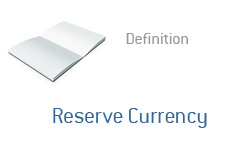Definition of Reserve Currency
What is the definition of "reserve currency"? What does the term "reserve currency" mean?
A reserve currency is a currency that is held in significant amounts by governments and institutions in order to help conduct transactions in the global market.
The major reserve currency of the planet right now is the US Dollar, which composes upwards of 60% of all forex reserves. The Euro has grown in prominence over the past decade as a reserve currency, and now makes up nearly 30% of all forex reserves through the world.
Commodities such as oil and gold are usually priced in a certain type of currency (US Dollars), meaning that governments need to have large pools of US Dollars (or Euros) in their foreign exchange reserves in order to engage in the buying and selling of these commodities.
 Converting from one currency to another costs money, which is why many countries will simply stockpile reserve currencies such as the USD or the Euro in order to avoid these costs.
Converting from one currency to another costs money, which is why many countries will simply stockpile reserve currencies such as the USD or the Euro in order to avoid these costs. The US Dollar has seen its status as the default global reserve currency challenged over the past few years. Why?
Many countries, especially China, have grown concerned over the fiscal policies of the United States over the past 3-4 years.
The United States, faced with trillion dollar deficits, has been forced to increase its money supply in order to fund its deficit spending. For a country like China, who has an unbelievable sum of US dollars in its forex reserves, this is not a welcome development. If the US prints more money, then the value of its existing dollars will drop. This is why China has grown increasingly agitated over the past few years, going as far as to call for the creation of a new global reserve currency.
--
Davemanuel.com Articles That Mention Reserve Currency:
The Euro Continues to Plunge
The US Dollar Continues To Plunge
Saudi Arabia, Japan Among Countries Denying Knowledge of "Secret" Oil Deal
Will the Dollar Crash?
